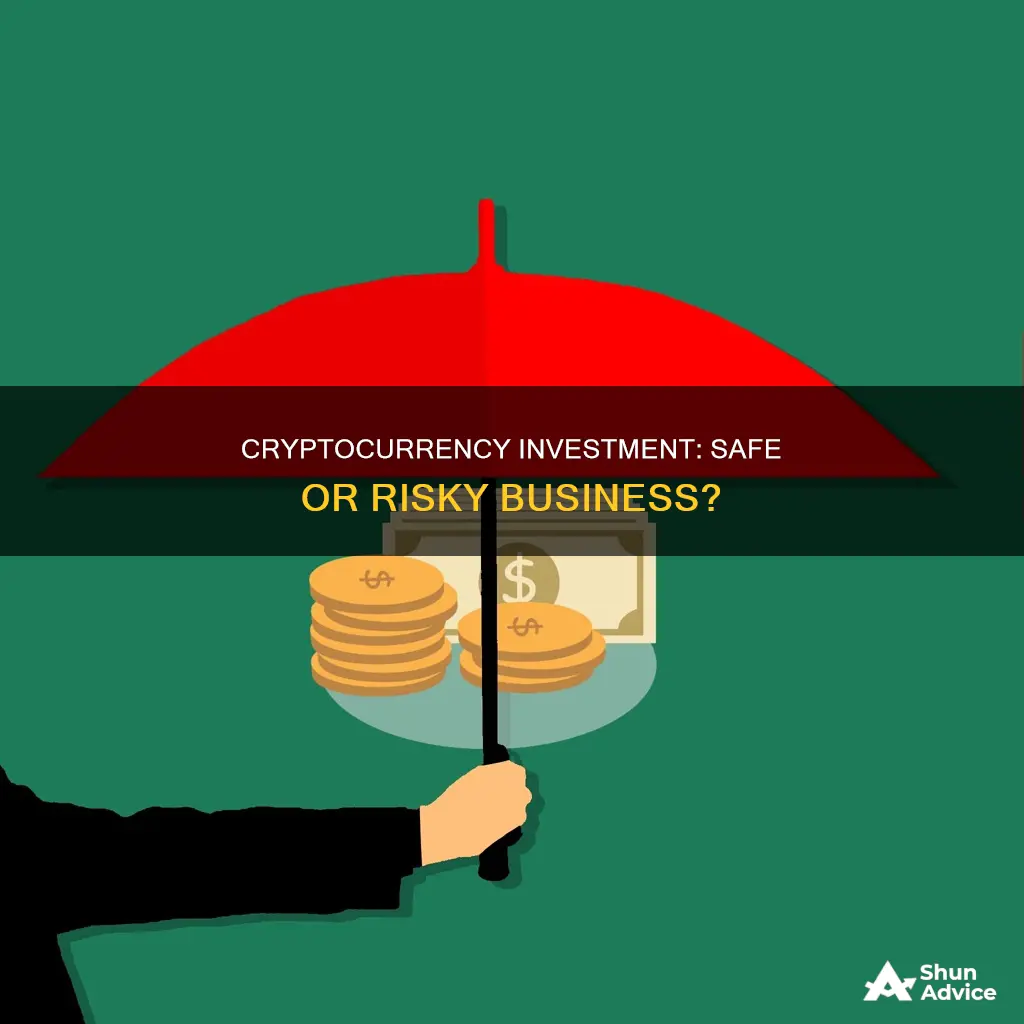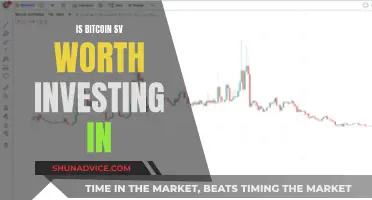
Investing in coins can be a lucrative prospect, but it is not without its risks. Coins can be a valuable investment, but it is important to understand what you are paying for and that there is a chance things may not work out as planned. Coins derive their value from two main sources: the physical metal they contain and their collector or numismatic value. The value of a coin is influenced by factors such as age, rarity, and condition. While investing in rare coins can be profitable, it is more challenging to predict the collector market for a particular coin in the future. Additionally, the coin market can be volatile, with prices fluctuating due to supply and demand.
When considering the safety of investing in coins, it is essential to distinguish between physical coins and cryptocurrencies. Physical coins, such as rare or antique coins, carry certain risks, including the possibility of counterfeit or altered coins. On the other hand, cryptocurrencies like Bitcoin and Ethereum are known for their extreme volatility and the presence of scammers looking to prey on newcomers. However, they also offer some security benefits, such as the use of blockchain technology, which provides a secure and public ledger of transactions.
Whether investing in physical coins or cryptocurrencies, it is crucial to conduct thorough research, evaluate the risks, and only invest what you can afford to lose.
What You'll Learn

Rare coins can be a profitable long-term investment
The rarer the coin, the more valuable it is. Coins can be a good investment, especially if you are passionate about them. If your collection doesn't increase in value, you can still enjoy it. Rare coins have offered significant profit potential, with prices of elite coins appreciating by more than 1,000% from 1976 to 1980, and 600% from 1982 to 1989.
However, investing in rare coins is not a quick process. It takes time and knowledge to become a successful coin collector. It is also important to note that the rare coin market can be volatile and is subject to fluctuations in demand.
To get started, it is recommended to find a mentor who can guide you through the process of determining the value of rare coins. You can also attend coin shows, join coin clubs, and read books and articles on the topic.
Which Crypto Coins Are Attracting Institutional Investors?
You may want to see also

Coins as collectibles
Coin collecting is one of the world's oldest hobbies, historically practised by royalty and the very wealthy. Today, coin collecting is an accessible hobby for anyone interested in owning a piece of history. Rare-coin investing can be profitable for long-term investing, but it is not ideal for short-term profits.
The value of a coin is influenced by a range of factors, including demand, rarity, age, and the type of metal used. The more rare the coin, the more valuable it is. For example, gold and silver coins from the Royal Canadian Mint can be saved and sold at a premium if the price of gold and silver rises. Coins made from gold and silver are often worth more than their face value.
Coins created by the United States Mint, the Royal Canadian Mint, and other mints are meant to be collector's items. Limited numbers and the materials used can make them valuable over time. For instance, the American Eagle 2022 One Ounce Gold Proof Coin and the 2024 S Kennedy Half Dollar Roll Gem DCam 99.9% Silver Proof 20 US Coins are available from the US Mint.
Coin collecting can be a risky investment, as it can be difficult and expensive to acquire coins that are especially rare or old. There is also a risk that the coins might not rise much further in value over time. It is important to trust the authentication of the coins and to be aware of the potential for counterfeit or doctored coins.
Coin collecting is not only a hobby that provides personal gratification, but it can also be a good investment and carries historical significance.
The Future of Crypto.com Coin: Is It Worth Investing?
You may want to see also

Factors that influence a coin's value
Investing in coins can be a profitable endeavour, but it is not without its risks. The value of a coin is influenced by a variety of factors, including:
- Rarity: The rarer a coin, the more valuable it tends to be. This is because there is a direct relationship between demand and price. When something is in high demand and short supply, its value increases.
- Supply: The total supply of a coin in the market depends on its initial mintage. If a coin is no longer being minted, its supply becomes fixed, which can increase its price.
- Metal Content: Coins with a high content of precious metals, such as gold or silver, tend to be more valuable. This is because they have an intrinsic metal value that can be melted down and sold.
- Age: Generally, the older a coin, the more valuable it is. This is partly due to the metals used to create them and their historical value.
- Condition: The condition of a coin plays a significant role in determining its value. Coins that have been well-preserved and are in perfect or near-perfect condition are worth more than identical coins with blemishes or signs of wear and tear.
- Grading: Coins are graded on a scale, typically from 1 to 70, with higher grades given to those in better condition. Coins with higher grades tend to be more valuable.
- Unique History: A coin with historical significance, such as being associated with a renowned ruler or event, can become a valuable collectible.
It is important to note that investing in coins can be risky, and there is no guarantee of profit. The value of a coin can fluctuate over time, and it may not always increase as expected. Additionally, there is a potential for counterfeit or altered coins, which can diminish their value.
Is 9coin a Good Investment? Exploring the Pros and Cons
You may want to see also

Coins as a hobby vs. investment
Coin collecting is a hobby for many, but it can also be a serious investment strategy. While some coins are bought purely for their aesthetic or historic appeal, others are chosen for their potential to increase in value over time. So, which approach is the right one? Let's explore the key differences between coin collecting as a hobby and an investment strategy.
Coins as a Hobby
Coin collecting is often driven by a passion for history, art, or the thrill of the chase. Collectors may focus on specific types of coins, such as ancient coins, coins from a particular country or era, or those with unique designs or minting errors. The condition, rarity, and age of a coin are also important factors for hobbyists. Many collectors take pride in completing sets or acquiring coins in the best possible condition. Coin shows and dealer networks are popular sources for hobbyists, and some even enjoy the bargaining process. Coin collecting can be an enjoyable and educational pursuit, offering insights into history, art, and culture.
Coins as an Investment
Investing in coins, on the other hand, is primarily focused on potential financial gains. Rare coins, limited editions, and those containing precious metals are often sought after by investors. The value of these coins can fluctuate based on market demands, the price of precious metals, and other economic factors. Investors need to be cautious and well-informed, as the coin market can be volatile and susceptible to risks such as counterfeits or altered coins. Building relationships with reputable dealers, conducting thorough research, and diversifying one's portfolio are essential strategies for coin investors. While investing in coins can offer significant profits, it is generally a long-term strategy and may not be suitable for those seeking quick returns.
Key Differences
The primary distinction between coin collecting as a hobby versus an investment lies in the motivation behind the acquisition. Hobbyists are often driven by personal interest, passion, or the desire to complete a collection. They may be less concerned about short-term financial gains and are usually willing to invest time and money into their collection without expecting immediate returns. In contrast, investors are primarily focused on the potential for financial appreciation. They approach coin acquisition with a strategic mindset, aiming to build a valuable portfolio that can generate profits over time. Investors are typically more concerned with market trends, supply and demand, and the potential for short or long-term gains.
In conclusion, coin collecting can be a rewarding hobby for those fascinated by history, art, or the thrill of the chase. On the other hand, investing in coins is a strategic financial decision aimed at generating profits. While both approaches have their merits, it is essential to understand the risks and potential rewards associated with each before diving into the world of coins.
Mark Cuban's Crypto Portfolio: His Top Investments
You may want to see also

Risks of investing in crypto
Investing in cryptocurrencies like Bitcoin carries a number of risks that investors should be aware of. Here are some of the key risks associated with investing in crypto:
Volatility and Price Manipulation
The cryptocurrency market is highly volatile, with frequent and significant price swings. Positive and negative news, such as tweets from influential figures or the threat of regulation, can heavily impact market prices. The unregulated and anonymous nature of the market, combined with the susceptibility of cryptocurrencies to sentiment, emotion, and publicity, makes prices vulnerable to manipulation by crypto exchanges, media owners, and influential investors. This manipulation is widespread, although not yet widely proven. Strategies such as wash trading, dark pool trading, pump and dumps, and shilling are commonly used to manipulate prices. The volatility and manipulation make it challenging for investors to build confidence and secure gains.
Security and Cyber-Security Risks
The decentralised and digital nature of cryptocurrencies makes them vulnerable to hacking and other cyber-security risks. If the private key to a digital wallet is lost, destroyed, or compromised, the associated bitcoins may be lost or stolen. Trading platforms and third-party service providers have also been targets of hacking and malicious activities, resulting in significant financial losses for investors. Additionally, data shows that a significant portion of crypto investors do not fully understand the technology, further amplifying the risk of security breaches.
Regulatory and Tax Risks
The lack of clear and consistent regulatory frameworks for cryptocurrencies creates uncertainty for investors. There are concerns about future restrictions on the use and ownership of cryptocurrencies, which may significantly impact their value or even lead to a complete loss of value if they are banned. Additionally, the tax treatment of cryptocurrencies varies across jurisdictions, and the lack of clear guidance makes it challenging for investors to understand their tax obligations and record-keeping requirements.
Limited Market Adoption and Competition
Cryptocurrencies and blockchain technology are still in their infancy, and market adoption remains low due to regulatory concerns, technology shortfalls, public misunderstandings, and volatility. There is a chance that this new asset class may never be broadly adopted, leading to a loss of value. Additionally, the limited supply of certain cryptocurrencies, such as Bitcoin, may be impacted by the emergence of competing cryptocurrencies or "forks" in the blockchain, diluting the value of the original currency.
Exchange and Liquidity Risks
The crypto market's off-ramps and exchanges pose challenges for investors. Many exchanges have high minimum withdrawal amounts and tedious verification processes for fiat withdrawals. Some exchanges are accused of withholding funds for unclear reasons, and banks are often wary of accepting money from cryptocurrency sales. Investors are exposed to exchange rates, fees, and the risks associated with dealing with opaque and unregulated exchanges.
The Ultimate Guide to Investing in Litecoin Cash
You may want to see also
Frequently asked questions
As with any investment, there is always a risk of loss when investing in coins. Coins can be a profitable investment when done right, but it is important to conduct thorough research and evaluate the safety of the project.
The value of coins is influenced by two main sources: the physical metal contained in the coin (bullion value) and its collector or numismatic value. The bullion value of a coin can be calculated by multiplying the number of ounces of metal by the spot price per ounce of that metal. The numismatic value depends on factors such as rarity, age, and condition of the coin.
One of the risks of investing in coins is the possibility of counterfeit or doctored coins. It is important to only buy coins from reputable dealers and ensure they are certified by professional coin grading services. Additionally, the coin market can be volatile, and coin prices can fluctuate due to supply and demand.
When investing in coins, it is important to have a balanced portfolio that includes a variety of coins such as rare coins, bullion coins, and coins with numismatic value. It is also crucial to understand the coin market and conduct thorough research before making any investments.







